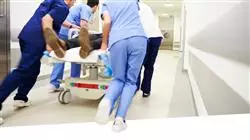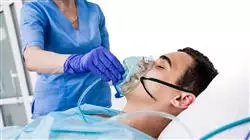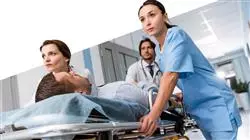University certificate
The world's largest faculty of nursing”
Why study at TECH?
This academic program constitutes a rigorous updating and improvement option for nurses who wish to be up to date on the latest interventional strategies in hospital Emergency Medicine”

Simplifying the use of medications when undertaking cardiopulmonary resuscitation is one of the tasks that today's Emergency, Emergency and Disaster Nursing professionals must master. However, not all personnel dedicated to this area of health care have the best possible training. Also, they have difficulties in acquiring advanced knowledge on the use of ultrasound-guided instruments to cannulate veins and other minor interventions. Difficulties at this academic level are related to shortcomings in the educational programs that fail to integrate practical and theoretical learning properly.
TECH, aware of this reality, overcomes other competitors in the educational market by developing this Hybrid professional master’s degree in Advanced Emergency and Catastrophe Nursing. It is distinguished from other degrees by its academic modality, divided into two phases. The first one will facilitate the assimilation of innovative from a 100% online and interactive learning platform. The neurologist will complete this educational phase in 1,500 hours and will be advised by a prestigious and demanding faculty.
In the second teaching stage, graduates will spend 3 weeks in a on-site clinical internship. From a first level institution, they will apply the skills and subjects received in the previous stage. These tasks will be carried out in the approach of real cases and, at all times, he will be supervised in order to expand his progress and involve him in different practical dynamics. At the same time, thanks to the wide network of agreements and collaborators at TECH's disposal, the student will be able to carry out this intensive and face-to-face stay in hospitals located in the geographical location of his or her choice. They will also work together with prestigious experts and will be supported by an assistant tutor to overcome any doubts that may arise in their daily Practice practice.
You will incorporate, thanks to TECH, the latest trends in nursing in the face of coronavirus infections”
This Hybrid professional master’s degree in Advanced Emergency and Critical Care Nursing contains the most complete and up-to-date scientific program on the market. The most important features include:
- Development of more than 100 clinical cases presented by nursing professionals
- The graphic, schematic, and practical contents with which they are created, provide scientific and practical information on the disciplines that are essential for professional practice
- An algorithm-based interactive learning system for decision-making in the clinical situations presented throughout the course
- Practical clinical guides on approaching different pathologies
- With a special emphasis on evidence-based medicine and research methodologies in Intensive Care Nursing
- All of this will be complemented by theoretical lessons, questions to the expert, debate forums on controversial topics, and individual reflection assignments
- Content that is accessible from any fixed or portable device with an Internet connection
- Furthermore, you will be able to carry out a clinical internship in one of the best hospital centers
Complete a 3-week intensive stay in a prestigious center and acquire the skills most in demand for the care of patients who are victims of major catastrophes”
In this Hybrid professional master’s degree, with a vocational nature and blended learning modality, the program is aimed at updating nursing professionals who require a high level of qualification. The content is based on the latest scientific evidence and is organized in a didactic way to integrate theoretical knowledge into nursing practice. The theoretical-practical elements allow professionals to update their knowledge and help them to make the right decisions in patient care.
Thanks to the multimedia content, developed with the latest educational technology, nursing professionals will benefit from situated and contextual learning, i.e., a simulated environment that will provide immersive learning programmed to train in real situations. This program is designed around Problem-Based Learning, whereby the physician must try to solve the different professional practice situations that arise during the course. For this purpose, the students will be assisted by an innovative interactive video system created by renowned and experienced experts.
You will master, through this Hybrid Degree, the criteria to be taken into account to simplify the number or type of drugs used in cardiopulmonary resuscitation as a nurse"

This immersive, comprehensive and intensive program covers the most up-to-date trends in hospital emergency medicine so that you can become a full-spectrum nurse"
Teaching Planning
The Hybrid professional master’s degree in Advanced Emergency and Critical Care Nursing has a comprehensive academic syllabus. Its academic modules include the main technological and therapeutic advances that facilitate the intervention of critically ill patients after complex accidents. At the same time, it examines the most recent criteria on transport and handling of this class of victims. In turn, the nurse will be able to inquire into the distinctive management for children and adults in trauma situations. All this, from a 100% online knowledge platform, with no pre-established study schedules or timetables.

TECH offers you all the advantages of 100% online teaching through an interactive platform with multiple theoretical, multimedia and interactive resources”
Module 1. Management and planning of care in emergencies, emergencies and disasters
1.1. Past, Present and Future of Accident and Emergency Services. New Therapeutic Approach
1.2. Epidemiology and Criteria for Emergency Department Saturation
1.3. Legal framework for Urgent and Emergency Care
1.4. Ethics Framework for Urgent and Emergency Care
1.5. Humanization. The Role of Nurses
1.6. Management and Quality
1.7. Registration Systems and Standardized Language Contingency Plans
1.8. Financial Resources for Emergency Health Care
1.9. Patient Security
Module 2. Triage. Advanced Disaster Management
2.1. Structuring of Accident and Emergency Services
2.2. Advanced Nursing Life Support (ALSN)
2.3. Multiple Victim Incidents and Disasters. Types and Characteristics
2.4. Triage Systems
2.5. Emergency Planning and Action Procedures
2.6. CBRN Incidents
2.7. Management of Fatalities and Victims. Humanitarian Assistance in Disasters
2.8. Medical Rescue in Special Situations
2.9. Medical Transport and Patient Transfer
Module 3. Advanced Vital Support
3.1. Introduction to Life Support
3.2. Advanced Life Support in Adults
3.3. Advanced Pediatric Life Support
3.4. Life Support in Special Situations
3.5. Advanced Life Support in the Patient with SARSCoV-2 Infection
3.6. Advanced CPR Procedures and Techniques
3.7. Post-Resuscitation Care
3.8. Organ and Transplants Donation
3.9. Ethical Dilemmas and Legal Framework
Module 4. Advanced approach to the patient with heart disease
4.1. Electrocardiography
4.2. Bradyarrhythmias
4.3. Tachyarrhythmias
4.4. Other Alterations in Electrical Conductivity
4.5. Implantable Devices
4.6. Cardioversion and Defibrillation
4.7. Mechanical Devices and other Therapeutic Techniques
4.8. Acute Coronary Syndrome. The Heart Attack Code
Module 5. Advanced approach to the patient with respiratory pathology
5.1. Respiratory Physiology and Mechanical Ventilation
5.2. Gas Exchange Alterations
5.3. Advanced Airway Management
5.4. Difficult Airway
5.5. Potentially Severe Respiratory Pathology
5.6. Invasive Mechanical Ventilation
5.7. Non-Invasive Mechanical Ventilation
5.8. Update on Ventilatory Therapies
5.9. Advanced Nursing Care of the Respiratory Patient
Module 6. Advanced Approach to other Potentially Serious Pathologies
6.1. Assessment of the Neurological Patient Scales
6.2. Stroke. Code Stroke
6.3. Ketoacidosis and Hyperosmolar Coma
6.4. Gastrointestinal Bleeding
6.5. Cardiogenic and Hypovolemic Shock Hemodynamic Assessment and Management
6.6. Obstructive and Distributive Shock. Hemodynamic Assessment and Management
6.7. Severe Infections: SEPSIS Code
6.8. Alterations in the Hydroelectrolyte Balance
6.9. Alterations in the Acid-base Equilibrium. Advanced Interpretation of Gassometry
6.10. Fluid Therapy and Transfusions
6.11. Advanced Nursing Care in Intravascular Catheters. Bacteremia Zero
Module 7. Advanced Approach to Traumatologic Emergencies
7.1. Magnitude and Epidemiology of Severe Trauma
7.2. Assessment and Stabilization of the Trauma Patient
7.3. The Polytraumatized Patient
7.4. Damage Control Resuscitation
7.5. Burns. Assessment and Management of the Severely Burned Patient
7.6. Advanced Nursing Care in Acute and Chronic Wounds Sutures
7.7. Fractures and Dislocations. Splinting and Casting
7.8. Pain as the 5th Vital Constant. Assessment and Management
Module 8. Rare and infectious-contagious diseases
8.1. Congenital Coagulopathies
8.2. Chemical Sensitivity
8.3. Main Infectious and Contagious Pathologies
8.4. Epidemiology, Pathogenesis, Pathophysiology, and Transmission Mechanisms of Coronavirus Infections
8.5. Microbiological Diagnosis and Management of SARS CoV2 Infection
8.6. Hemorrhagic Fevers
8.7. Insulation and Safety Measures
8.8. Dangerous Waste and Drug Management
8.9. Personal Protective Equipment (PPE). Staff Education and Simulation
8.10. Adaptation of an Emergency Department to New Contagious Diseases
Module 9. Care Applied to the Different Life Stages of a Patient in the Emergency Unit
9.1. The Anatomical and Physiological Changes in the Pregnant Woman
9.2. Major Pregnancy Urgent Pathologies
9.3. Delivery Assistance and Immediate Care
9.4. Anatomical and Physiological Characteristics of the Pediatric Patient
9.5. Major Pediatric Urgent Pathologies
9.6. Special Considerations in Therapeutics and Pharmacology
9.7. Gender Violence and Abuse
9.8. Situation of the Last Days Palliative Sedation and Euthanasia
9.9. Communication with the Family and Coping with Mourning
Module 10. Toxicology and Advanced Approach to the Psychiatric Patient
10.1. Drugs of Abuse and Intoxication. Chemical Submission
10.2. Advanced Management of Acute Poisoning Antidotes
10.3. Epidemiology and Legal Framework of the Psychiatric Patient
10.4. Self-induced Suicidal Ideation and Attempt
10.5. Behavioral Alterations
10.6. Communication Strategies and Verbal Restraint
10.7. Mechanical Restraint and Safety
10.8. Emotional Impact on Working Staff in Emergency Departments
Module 11. Teaching Methods and New Technologies in the Emergency Department
11.1. Physical Fundamentals of Ultrasound, History and Advances
11.2. Identification of Structures, Planning and Application of Ultrasound in Advanced Emergency Department Practice
11.3. Limitations in the Use of Ultrasound for Patient Assessment in Emergency Departments
11.4. Assessment of Venous Capital and Vascular Economy, Ultrasound Approach to Venous Access in the ED
11.5. Long-term Catheter Insertion, Feasibility and Alternatives to Short Peripheral Cannulae
11.6. Ultrasound-guided/echo-assisted Procedures as a Support to Care Practice (Bladder Catheterization, Nasogastric Catheterization, Obtaining Samples)
11.7. Alternatives to Radiodiagnostics in Catheter Tip Localization
11.8. Teaching in Emergency Care, Educational Planning and Objectives for Students
11.9. Practicality of the Simulation and Updating of Knowledge
11.10. Communication Techniques in Clinical Simulation Scenario Preparation
Module 12. Update on Coronavirus Infections
12.1. Discovery and Evolution of Coronaviruses
12.1.1. Discovery of Coronaviruses
12.1.2. Global Trends in Coronavirus Infections
12.2. Main Microbiological Characteristics and Members of the Coronavirus Family
12.2.1. General Microbiological Characteristics of Coronaviruses
12.2.2. Viral Genome
12.2.3. Principal Virulence Factors
12.3. Epidemiological Changes in Coronavirus Infections from its Discovery to the Present
12.3.1. Morbidity and Mortality of Coronavirus Infections from their Emergence to the Present
12.4. The Immune System and Coronavirus Infections
12.4.1. Immunological Mechanisms Involved in the Immune Response to Coronaviruses
12.4.2. Cytokine Storm in Coronavirus Infections and Immunopathology
12.4.3. Modulation of the Immune System in Coronavirus Infections
12.5. Pathogenesis and Pathophysiology of Coronavirus Infections
12.5.1. Pathophysiological and Pathogenic Alterations in Coronavirus Infections
12.5.2. Clinical Implications of the Main Pathophysiological Alterations
12.6. Risk Groups and Transmission Mechanisms of Coronaviruses
12.6.1. Main Sociodemographic and Epidemiological Characteristics of Risk Groups Affected by Coronavirus
12.6.2. Coronavirus Mechanisms of Transmission
12.7. Natural History of Coronavirus Infections
12.7.1. Stages of Coronavirus Infection
12.8. Latest Information on Microbiological Diagnosis of Coronavirus Infections
12.8.1. Sample Collection and Shipment
12.8.2. PCR and Sequencing
12.8.3. Serology Testing
12.8.4. Virus Isolation
12.9. Current Biosafety Measures in Microbiology Laboratories for Coronavirus Sample Handling
12.9.1. Biosafety Measures for Coronavirus Sample Handling
12.10. Up-to-Date Management of Coronavirus Infections
12.10.1. Prevention Measures
12.10.2. Symptomatic Treatment
12.10.3. Antiviral and Antimicrobial Treatment in Coronavirus Infections
12.10.4. Treatment of Severe Clinical Forms
12.11. Future Challenges in the Prevention, Diagnosis, and Treatment of Coronavirus
12.11.1. Global Challenges for the Development of Prevention, Diagnostic, and Treatment Strategies for Coronavirus Infections

The teaching materials of this program, elaborated by these specialists, have contents that are completely applicable to your professional experiences”
Hybrid Professional Master’s Degree in Advanced Emergency and Critical Care Nursing
If you are a nursing professional passionate about providing quality care in critical situations, the Hybrid Professional Master's Degree in Emergency Nursing, Advanced Emergencies and Disasters from TECH Global University is the perfect program for you. Become an expert in the management of urgent and emergency situations, acquiring the skills and knowledge necessary to save lives and provide specialized care in times of crisis. Our Hybrid Professional Master's Degree in Emergency Nursing, Advanced Emergencies and Disasters will provide you with comprehensive, up-to-date training in key areas such as pre-hospital care, critical incident management, disaster management and psychological support for patients and families. You will learn to make quick and effective decisions, coordinate multidisciplinary teams and work in complex and changing environments.
Enroll now and experience the best of two modalities
At TECH Global University, we know that hands-on practice is essential for effective learning in the field of emergency, emergency and disaster nursing. For this reason, we have designed a blended program that combines online theoretical classes with face-to-face practice in real clinical settings. This modality allows you the flexibility to study from anywhere, while giving you the opportunity to apply your knowledge in real situations under the supervision of experienced professionals. We are proud to have a team of highly qualified professors specialized in the area of emergency and catastrophic nursing. They will guide you through the program, providing academic support and one-on-one mentoring to ensure your success in developing your professional skills. Get ready to make a difference in the field of emergency and disaster nursing. Join TECH Global University's Hybrid Professional Master's Degree in Emergency Nursing, Advanced Emergencies and Disasters and become a leader capable of meeting the most demanding challenges and providing quality care in critical times. Your calling to save lives deserves the best preparation!







